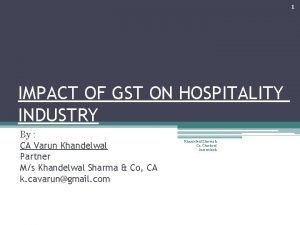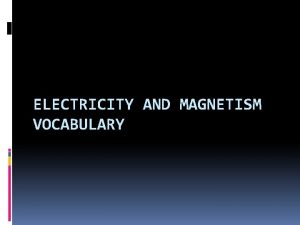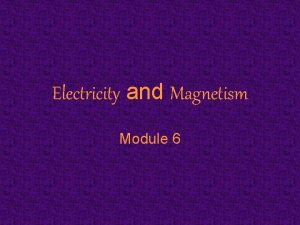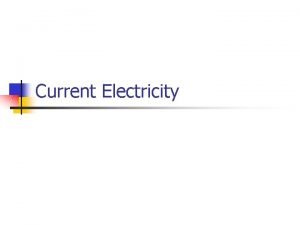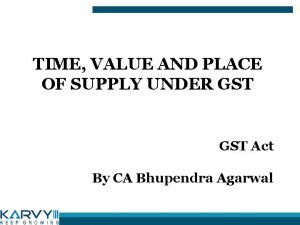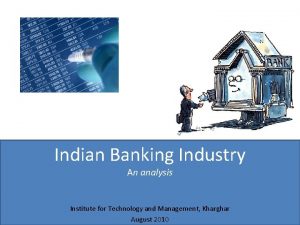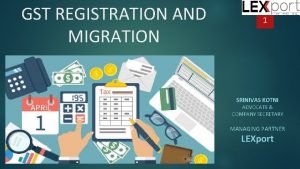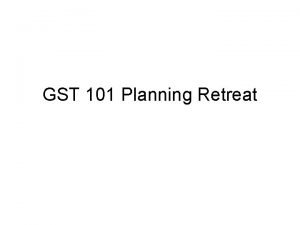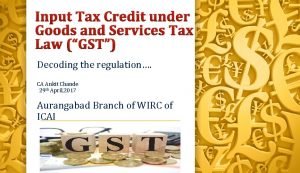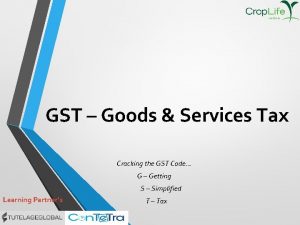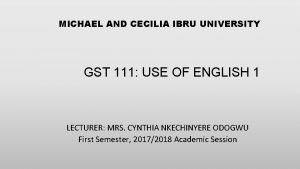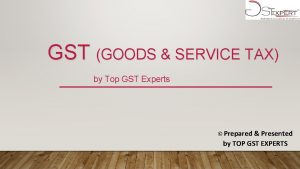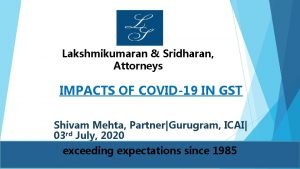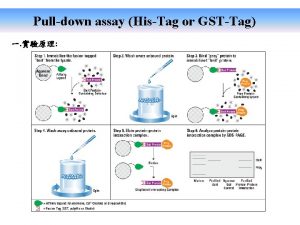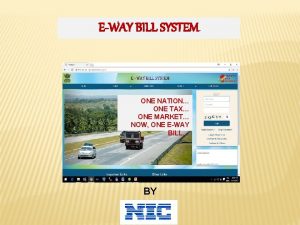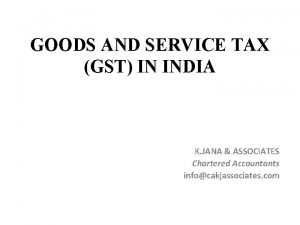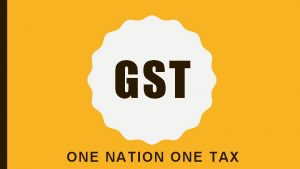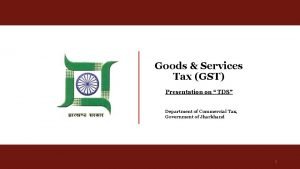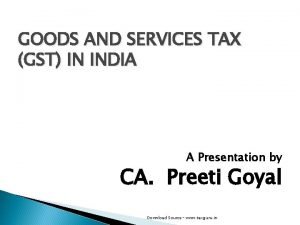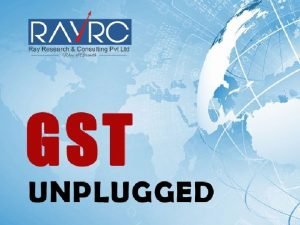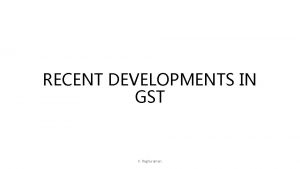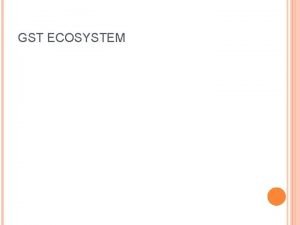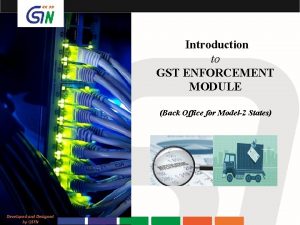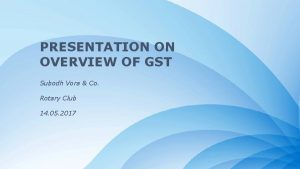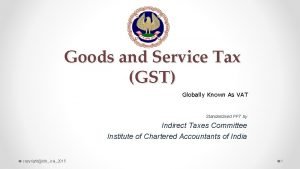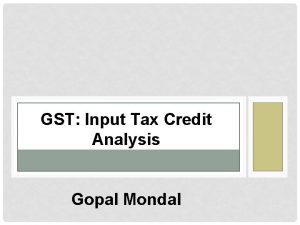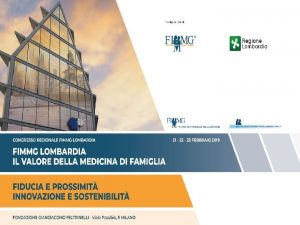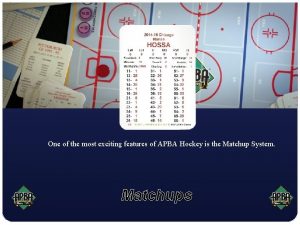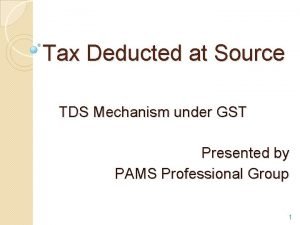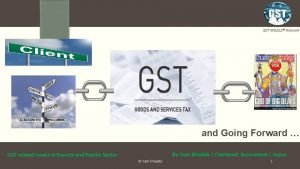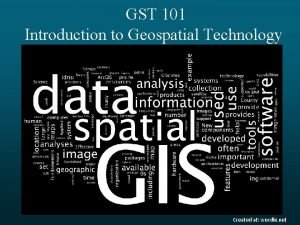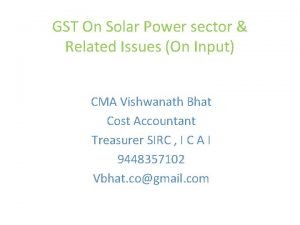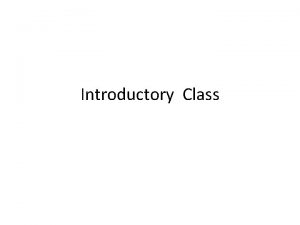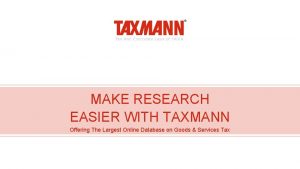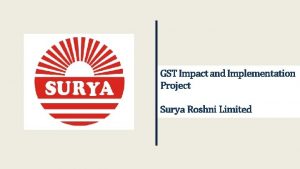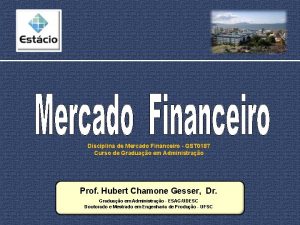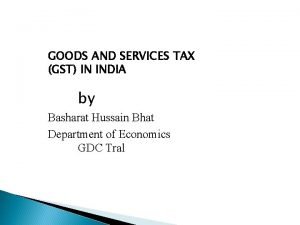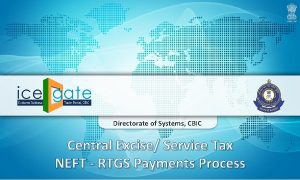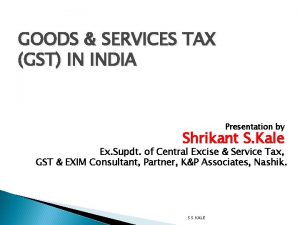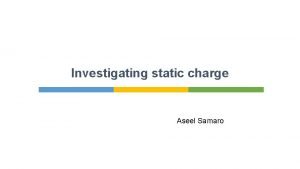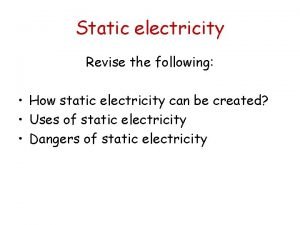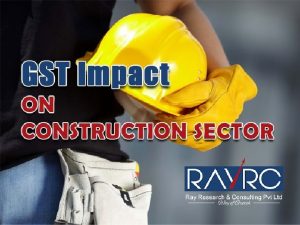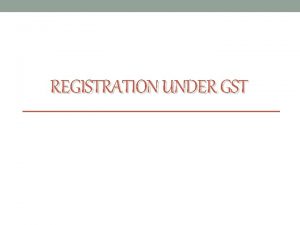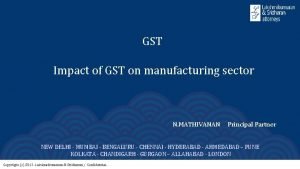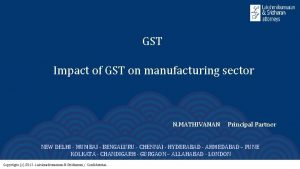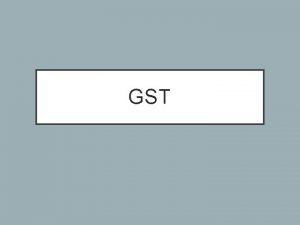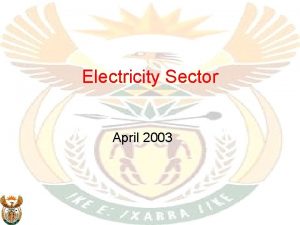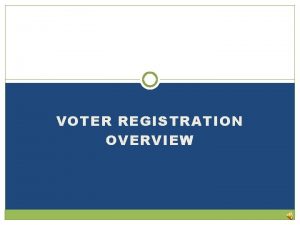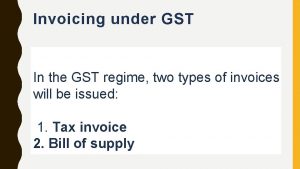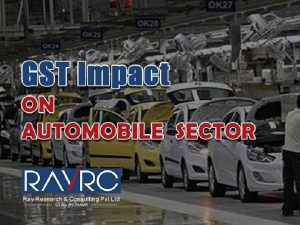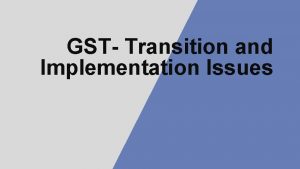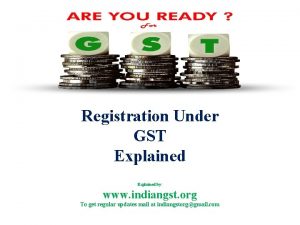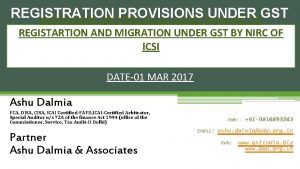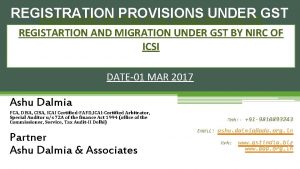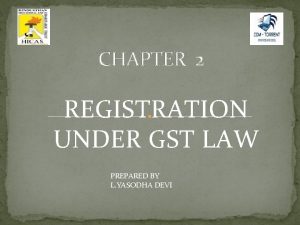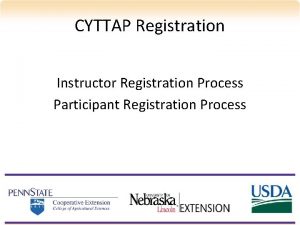GST Overview Electricity sector Registration under GST Impact














































- Slides: 46

GST Overview – Electricity sector Registration under GST Impact on Contracts S. Thirumalai 28 Nov 17

GST in India 2

Existing Indirect Taxes in India Various Taxes Entry Tax & Octroi Customs Duty Excise Duty Entertainment Tax Electricity Duty Central Levies Central Cess Sales Tax Luxury Tax Service Tax VAT State Levies 3

The Constitution (101 st Amendment) Act, 2016 4

The Constitution (101 st Amendment) Act, 2016 Significant Amendments Relevant Definitions: Article 366(12) [No change] • “Goods” includes all materials, commodities and articles Article 366(26 A) • “Services” means anything other than goods Article 366(26 B) • ‘State’ for the purpose of Article 246 A, 268, 269 A and 279 A would also include Union territories with legislature Article 366(12 A) • GST means any tax on supply of goods, or services or both except taxes on the supply of the alcoholic liquor for human consumption 5

Overview of GST 6

Birds eye view of GST • GST – a destination based consumption tax on goods and services • Both, Centre and State to levy taxes on goods and services • GST expected to replace the existing tax structure which is plagued with multiplicity of Central and State taxes • GST considered a progressive system of taxation; will bring Indian taxation system in parity with the system existent in the developed countries • Seamless credit across entire supply chain and across all the States / Union Territories “GST is a progressive step in the direction of tax reforms” 7

State cesses & surcharges on goods & services e ic rv Se C D ent Ex uty ral ci + Ex se A c du ddi ise tion * s a l Taxes subsumed in GST x ta VAT CGST l na l & itio s na dd tom tio A s di ial Cu Ad ec of Sp uty D C su ent go rch ral od ar ce s ge ss & s es se on & rv ic es Taxes on lottery, betting, gambling SGST Central Sales Tax Purchase Tax & Luxury Tax Entry Tax & Octroi Entertainment Tax (except by local bodies) Note: 1) Alcoholic beverages for human consumption are kept out of the purview of GST 2) GST on petroleum products would be levied from a notified date recommended by the GST Council 3) *Excise duty levied under Medicinal & Toilet Preparations (Excise Duties) Act, 1955 is also subsumed 8

Illustration of GST Assumptions: (1) Rate of Excise Duty- 12. 5%; (2) VAT Rate- 12. 5%; (3) CGST- 9% ; (4) SGST Rate- 9% ; (5) Profit Margin- 10, 000/- fixed (before tax) Particulars Under VAT Under GST (Intra State) Under GST (Inter State) Cost of production 90, 000 Add: Profit Margin 10, 000 1, 00, 000 1, 000 Add: Central Excise Duty @ 12. 5% 12, 500 - - Add: VAT @ 12. 5% on 1, 12, 000/- 14, 000 - - Add: CGST @ 9% - 9, 000 - Add: SGST @ 9% - 9, 000 - 1, 26, 500 1, 18, 000 1, 000 Producers Basic Price Add: IGST @ 18% Sale Price 9

GST model broad architecture State wise Registration and Compliances Multi-tier rate structure Transitional Provisions on Cenvat Credit, pending litigation, registration certificate etc. Introduced Concept of Point of Taxation for goods as well as service Separate provisions for determining the place of supply of Goods/ services Goods includes actionable claims and also nclude intangibles Works contract is treated as service GST Architecture Free Supplies of Goods/ Services i. e. supplies without consideration to related person or distinct person as per Sec 15 to be taxable Inter-State Input Tax Credits along with Concept of Input service distributor Taxable supplies to include interstate Branch Transfers Securities kept outside the bracket of Goods/Services 10

Levy of GST 11

Meaning of Supply Base of ‘taxable event’ expanded • Goods and services supplied without consideration for furtherance of business also covered under supply Inclusive definition Made for consideration Deemed supply Supply Importation • Business Assets put to non-business use, even without consideration would be supply • Transaction involving free supply have been covered in the definition of supply Made without consideration • Branch transfer also covered under ambit of supply

Levy, Taxable person and Exemption CGST and SGST will be levied and collected on all ‘intra-state supplies’ of goods and/ or services at the specified rate. IGST will be levied and collected on all ‘inter-state supplies’ of goods and/ or services at the specified rate. For certain notified categories of goods/ services, as per the recommendation of the GST Council, the tax will be payable on reverse charge basis

GST Set off Chain Set-off methodology • Central GST and State GST are expected to be treated separately • The credit availed of Central GST paid on goods and services received is expected to be utilized only against the payment of Central GST • The same principle could apply for the set off of State GST • Cross utilization of input tax credit between the Central GST and the State GST would not be allowed CGST SGST 15

GST Credit Mechanism CGST Input CGST against – CGST IGST SGST Input SGST against - Input IGST against – SGST IGST CGST SGST 16

Bundled Supply Description Naturally bundled Supplied together Can be supplied separately One is predominant supply for recipient Other supply is not ‘aim in itself’ of recipient Each supply priced separately Composite Supply Yes Mixed Supply No Yes No No No All supplies are goods Yes All supplies are services Yes One supply is goods and other supply Yes is services No Yes Yes

Exemptions under GST 18

Exempt Supplies § Section 2(47) – “exempt supply” means supply of any goods or services or both which − attracts nil rate of tax or which may be wholly exempt from tax under section 11, or − under section 6 of the Integrated Goods and Services Tax Act, and includes − non-taxable supply • Section 2(78) – “non-taxable supply” means a supply of goods or services or both which is not leviable to tax under this Act or under the Integrated Goods and Services Tax Act § Section 16(1) of IGST Act – “zero-rated supply” means any of the following taxable supply of goods and/or services, namely o Export of goods and/or services o Supply of goods and/or services to a SEZ developer or an SEZ unit § Sch III “neither a supply of goods nor a supply of services”

Schedule III - Activities not treated as Supply 1. Services by an employee to the employer in the course of or in relation to his employment. 2. Services by any Court or Tribunal established under any law for the time being in force. 3. (a) The functions performed by the Members of Parliament, Members of State Legislature, Members of Panchayats, Members of Municipalities and Members of other local authorities; (b) The duties performed by any person who holds any post in pursuance of the provisions of the Constitution in that capacity; or (c) The duties performed by any person as a Chairperson or a Member or a Director in a body established by the Central Government or a State Government or local authority and who is not deemed as an employee before the commencement of this clause 4. Services of funeral, burial, crematorium or mortuary including transportation of the deceased. 5. Sale of land subject to clause (b) of para 5 of Sch II, sale of building 6. Actionable claims, other than lottery betting and gambling

Exemptions under Section 11 1. Notification 2 dated 28 June 2017 as amended from time to time has been issued under the Central/State GST Act in respect of goods 2. Notification 12 dated 28 June 2017 as amended from time to time has been issued in respect of services under the Central/State GST Act 3. Separate notifications have been issued under the IGST Act, 2017 for the purpose of exempting goods or services supplied as part of interstate supplies

GST impact on electricity companies 1. Entry 53 List II of Seventh Schedule of The Constitution of India covers “Taxes on the consumption or sale of electricity” (State List) 2. The Constitution 101 st Amendment Act, 2016 retained the above entry and did not subsume the same into the GST 3. Hence, the power to levy the tax on electricity continues to be with the state government which is derived from the Seventh Schedule to the Constitution. 4. Further entry 25 in the Notification 12/2017 -Central dated 28 June 2017 (Exemption notification) has exempted transmission or distribution of electricity by an electricity transmission or distribution utility. 5. Thus both generation and transmission utility are kept out of the scope of GST

GST impact on electricity companies 1. “Electricity transmission or distribution utility” means the Central Electricity Authority; a State Electricity Board; the Central Transmission Utility or a State Transmission Utility notified under the Electricity Act, 2003 (36 of 2003); or a distribution or transmission licensee under the said Act, or any other entity entrusted with such function by the Central Government or, as the case may be, the State Government; 2. Central Electricity Authority” means the authority constituted under section 3 of the Electricity (Supply) Act, 1948 (54 of 1948) 3. Central Transmission Utility” shall have the same meaning as assigned to it in clause (10) of section 2 of the Electricity Act, 2003 (36 of 2003); 4. State Electricity Board” means the Board constituted under section 5 of the Electricity (Supply) Act, 1948 (54 of 1948); 5. State Transmission Utility” shall have the same meaning as assigned to it in clause (67) of section 2 of the Electricity Act, 2003 (36 of 2003);

Registration under GST 24

Registration key provisions 1. There are three key sections i. e. Section 22, 23 and 24 that governs registration aspects a) Section 22 specifies criteria, if fulfilled, registration becomes mandatory b) Section 23 provides exemption from registration in certain cases c) Section 24 provides for mandatory registration in case of specified cases 2. Key triggers for registration: a. Applicable to supplier supplying taxable goods or services b. Minimum turnover limit is Rs. 20 lakhs for applicability 3. Exemption from registration a. Person engaged exclusively in the supplies not liable to tax or wholly exempt from tax b. An agriculturist

Registration key provisions 1. Mandatory registration a) Inter-state taxable supplies b) Casual taxable persons making taxable supplies c) persons who are required to pay tax under reverse charge; d) Non resident taxable persons making taxable supply e) Persons required to deduct tax f) Principal or agents of taxable supplies g) Input service distributors h) Persons supplying through e-commerce operators i) Every electronic commerce operator j) Every person supplying OIDAR services from a place outside India

Registration key provisions 1. The likely criteria that may trigger mandatory registration provisions for electricity companies can be: a) Persons who are required to pay tax under reverse charge; b) Persons required to deduct tax 2. List of goods covered under Reverse charge a) Cashew nuts, not shelled or peeled, Bidi wrapper leaves (tendu), Tobacco leaves, Silk yarn, Supply of lottery, Used vehicles, seized and confiscated goods, old and used goods, waste and scrap b) In all of the above cases, the recipient is liable to pay the tax by registering under the GST as mandatory registration is applicable

Registration key provisions 1. List of services covered under Reverse charge (the list is not exhaustive) a) Supply of Services by a goods transport agency (GTA) b) Services provided by an individual advocate including a senior advocate or firm of advocates by way of legal services, directly or indirectly c) Services supplied by an arbitral tribunal to a business entity. d) Services provided by way of sponsorship to any body corporate or partnership firm. e) Services supplied by the Central Government, State Government, Union territory or local authority to a business entity excluding renting of immovable property, services by department of posts, services in relation to aircraft or a vessel, transport of goods or passengers f) Services supplied by a director of a company or a body corporate to the said company or the body corporate.

GST Tariff – power sector (the list is not exhaustive) 29

Goods Tariff 5% Category Entry 234 – HSN 84 or 85 Following renewable energy devices & parts for their manufacture (a) Bio-gas plant (b) Solar power based devices (c) Solar power generating system (d) Wind mills, Wind Operated Electricity Generator (WOEG) (e) Waste to energy plants / devices (f) Solar lantern / solar lamp (g) Ocean waves/tidal waves energy devices/plants

Goods Tariff (continued. . ) 18% Category Entry 388 – HSN 8535 Electrical apparatus for switching or protecting electrical circuits, or for making connections to or in electrical circuits (for example, switches, fuses, lightning arresters, voltage limiters, surge suppressors, plugs and other connectors, junction boxes), for a voltage exceeding 1, 000 volts Entry 388 A HSN 8536 Electrical apparatus for switching or protecting electrical circuits, or for making connections to or in electrical circuits (for example, switches, relays, fuses, surge suppressors, plugs, sockets, lamp-holders, and other connectors, junction boxes), for a voltage not exceeding 1, 000 volts : connectors for optical fibres, bundles or cables

Goods Tariff (continued. . ) 18% Category Entry 451 – HSN 9801 All items of machinery including prime movers, instruments, apparatus and appliances, control gear and transmission equipment, auxiliary equipment (including those required for research and development purposes, testing and quality control), as well as all components (whether finished or not) or raw materials for the manufacture of the aforesaid items and their components, required for the initial setting up of a unit, or the substantial expansion of an existing unit, of a specified: (1) industrial plant ; (2) irrigation project ; (3) power project ; (4) mining project ; (5) project for the exploration for oil or other minerals, and (6) such other projects as the Central Government may, having regard to the economic development of the country notify in the Official Gazette in this behalf; and spare parts, other raw materials (including semi-finished materials of consumable stores) not exceeding 10% of the value of the goods specified above, provided that such spare parts, raw materials or consumable stores are essential for the maintenance of the plant or project mentioned in (1) to (6) above.

Goods Tariff (continued. . ) 28% Category Entry 139 HSN 8504 Static converters (for example, rectifiers) and inductors [other than Transformers Industrial Electronics; Electrical Transformer; Static Convertors (UPS)] Services Tariff 18% category Heading 9969 - Electricity, gas, water and other distribution services. Heading 9986 - Support services to mining, electricity, gas and water distribution

Impact on contracts 34

Contracts under GST Relevant provisions under GST as applicable to the Contracts: 1. All the labour contracts are treated as supply of services 2. All the works contracts are treated as supply of services 3. works contracts are composite supplies. However there is a distinction between the composite supplies and the supplies by way of works contracts 1. As per Section 2 (119) “works contract means a contract for building, construction, fabrication, completion, erection, installation, fitting out, improvement, modification, repair, maintenance, renovation, alteration or commissioning of any immovable property wherein transfer of property in goods (whether as goods or in some other form) is involved in the execution of such contract; 2. The term immovable property is not defined in the act

Contracts under GST (continued. . ) Relevant provisions under GST as applicable to the Contracts: 1. As per Section 8(a) “a composite supply comprising two or more supplies, one of which is a principal supply, shall be treated as a supply of such principal supply” 2. Thus composite supply comprises supplies which can be any combination of both the goods or services 3. The main distinction between the works contract and composite supply is that the former is applicable in case of stated activties w. r. t immovable properties whereas the composite supplies are applicable both for movable and immovable properties 4. Thus composite supplies includes all types of contracts including works contracts, however works contract though a composite supply does not cover all kinds of composite supplies

Contracts under Service tax regime 1. In case of works contracts, the service portion is taxable as service. This is a declared service under Section 66 E of the Act 2. Works contract has been defined in section 65 B of the Act as a contract wherein transfer of property in goods involved in the execution of such contract is leviable to tax as sale of goods and such contract is for the purpose of carrying out construction, erection, commissioning, installation, completion, fitting out, repair, maintenance, renovation, alteration of any moveable or immoveable property or for carrying out any other similar activity or a part thereof in relation to such property. 3. Thus works contract under the erstwhile service tax era included both moveable and immovable properties 4. To the extent of goods portion, the VAT was charged and service tax was charged on service portion

Contracts under Service tax regime (continued. . ) 1. As against above, in GST the definition of works contract covers only immovable property and these contracts are classified as services 2. All other composite supplies were charged to VAT or Service tax. 3. In GST, the definition of composite supply requires determination of principal supply. If the principal supply is goods, then all the provisions such as place of supply, valuation, input tax credit etc as applicable to goods will be applied

Contract issues Contracts for supply, erection, installation of transmission and distribution lines prior to GST regime 1. Since these contracts resulted in immovable properties, the definition of works contract as defined in Section 65 B was relevant. 2. Accordingly, these contracts were regarded as works contracts even when there were separate agreement for supply of goods and rendition of erection services : : Transglobal power 2014 -VIL-348 -KAR 3. Both VAT and Service tax were applicable on these contracts

Contract issues Towers as immovable property Since erection of towers result in immovable property, the treatment under the previous VAT and Service tax regime was subject to tax under both legislations. ( Indus Towers ( Karnataka) Indus Towers Ltd. vs. Deputy Commissioner of Commercial Taxes Enforcement, 2012 (285) ELT 3 (Kar) and Delhi : Indus Towers Ltd. v. Commissioner & Ors. : W. P. (C) 4976/2011 Delhi; Bharath Sanchar Nigam ( AP) 2011 -TIOL-731 -HC-AP-ST

Contract issues All inclusive contracts v split contracts 1. In GST if the contract results in works contract, then it shall be treated as supply of service and accordingly the relevant provisions shall apply 2. However, if the contract is not a works contract, then the principal supply shall be determined based on such contract 3. All inclusive contracts if they result in immovable property, than they shall be treated as supply of service

Comparison: CAPEX v OPEX Under the previous regime: Excise duty exempt OEM to Power Genco based on international competitive bidding; other equipments VAT 2% with C Form; Declared Goods VAT 5%; Other goods as applicable; Customs duty exempt; Civil and service contracts all inputs and services were a cost since output was exempt IMPORT: PRESENT PREVIOUS OEM 100 CUSTOMS DUTY EXEMPT LANDED PRICE 100 CVD/IGST 18 EXEMPT 118 100 TOTAL COST (18%)

Comparison: CAPEX v OPEX DOMESTIC: PRESENT PREVIOUS OEM 100 EXCISE/IGST (18%) 18 EXEMPT LANDED PRICE 118 100 CST (2%) - 2 TOTAL COST 118 102 CONCEPT OF C FORM FOR POWER COMPANIES AVAILABLE

Comparison: CAPEX v OPEX CIVIL WORKS: PREVIOUS REGIME : 15% OR CONCESSIONAL RATE IGST : 12% OR 18%

Comparison: EPC MODEL COMPANY A (GUJ) 6(2) Sale COMP B (MP) COMP C (UP)GEN Main contract for supply erection between Comp C and Comp B Co. B EPC contractor sub contract to OEM Co A. Present Previous OEM 100 Excise - exempt GST 18% 18 (CST 2%) 2 EPC Margin 20 20 GST 18% 3. 6 - Total cost 122 141. 6

Comparison: OPEX PREVIOUS: FUEL COAL HSD : ED 2% OR 6% ; ED FUEL 10 TO 15%; VAT ON COAL 5% OR 2% CST; SECONDARY FUEL 12. 5 TO 20%; CLEAN ENERGY CESS Rs 400 PMT GST: COAL 5% OTHERS 18% CLEAN ENERGY CONTINUES; SERVICE TAX AND GST ON INPUTS A COST; ELECTRIC METERS 18% SUMMARY: CAPITAL COST ; WORKING CPA: O&M COST: EFFECT ON OPEN ACCESS POWER AND PPA ?

Thank You
 Impact of gst on construction industry
Impact of gst on construction industry Impact of gst on hotel industry pdf
Impact of gst on hotel industry pdf Electricity and magnetism vocabulary
Electricity and magnetism vocabulary Static electricity and current electricity
Static electricity and current electricity Current electricity
Current electricity Ppt on itc under gst
Ppt on itc under gst Time and value of supply under gst
Time and value of supply under gst Indian banking sector overview
Indian banking sector overview Gst suo moto cancellation revoke
Gst suo moto cancellation revoke Retreat evaluation form
Retreat evaluation form Section 18(1)(c) of gst
Section 18(1)(c) of gst 28% gst
28% gst Ibru language
Ibru language Gst rates on services pdf
Gst rates on services pdf Gst168
Gst168 Gst pulldown assay
Gst pulldown assay Ewaybillsystem
Ewaybillsystem Gst concept
Gst concept Introduction of gst
Introduction of gst Gst em signer error link
Gst em signer error link Direct tax and indirect tax
Direct tax and indirect tax Conclusion on gst
Conclusion on gst Gst deduction at source
Gst deduction at source Definition of gst
Definition of gst Gst ecosystem
Gst ecosystem Gst law enforcement
Gst law enforcement Gst 105 pdf
Gst 105 pdf Subodh vora & co
Subodh vora & co Role of gst
Role of gst Section 18(1)(c) of gst
Section 18(1)(c) of gst Diagnostica di primo livello
Diagnostica di primo livello Gst matchup chart
Gst matchup chart Gst deduction at source
Gst deduction at source Yash
Yash Gst 101
Gst 101 Gst notification on solar power generating system
Gst notification on solar power generating system Philosophy and human existence gst 113
Philosophy and human existence gst 113 Taxmann gst rate finder
Taxmann gst rate finder Invalid login credentials error in eway bill
Invalid login credentials error in eway bill Negative list of gst
Negative list of gst Grupo financiero gst
Grupo financiero gst What is gst
What is gst Cbicpay
Cbicpay Annexure b for gst refund
Annexure b for gst refund Before gst tax structure in india
Before gst tax structure in india Does magnetic field exerts force on a static charge
Does magnetic field exerts force on a static charge Static electricity in photocopiers
Static electricity in photocopiers

